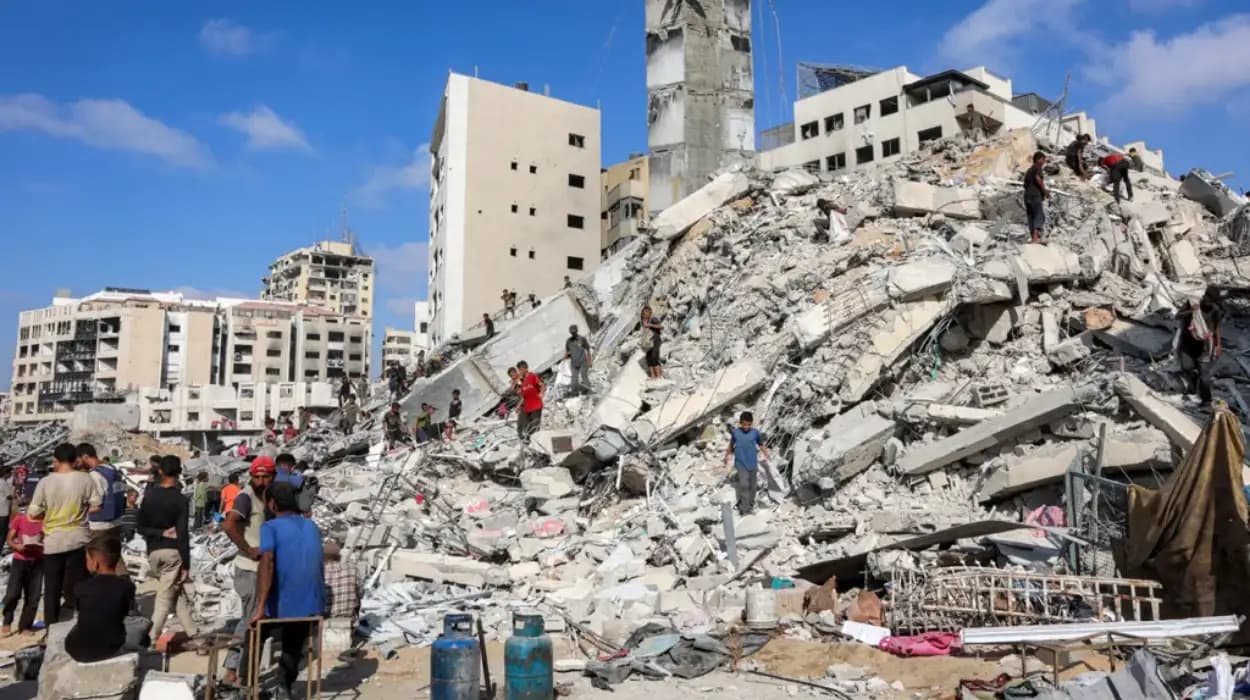Israel has demolished a prominent tower in Gaza City,
intensifying its campaign of forced displacement against Palestinians. This
latest action, widely reported by international media and condemned by the
United Nations, underscores the escalation of conflict and humanitarian crisis
in Gaza.
Israel Levels Gaza City Tower Amid Displacement Campaign
The recent demolition of a major residential and commercial
tower in Gaza City marks a significant escalation in Israel’s ongoing military
operations and forced displacement policy against Palestinians, according to
reports from The Guardian’s Bel Trew and Al Jazeera’s Charlotte Bellis. The
tower, known locally as the Al-Jalaa Tower, housed offices, apartments, and
several media outlets before being razed by Israeli airstrikes late on 8
September 2025.
According to The Guardian, Israel justified the demolition
by alleging the building contained military assets linked to Hamas, a claim
contested by international observers and journalists who note the extensive
civilian presence in the tower prior to its destruction. The airstrike forced
thousands of residents and workers to evacuate on short notice, deepening the
humanitarian crisis in Gaza, an already densely populated and blockaded
territory.
Statements from Israeli officials relayed by The New York
Times emphasized the country's security rationale, stating that neutralizing
Hamas’ infrastructure was paramount to preventing attacks against Israeli
civilians. However, UN officials, including spokesperson Stéphane Dujarric quoted
by the United Nations News service, condemned the action as an unlawful
collective punishment and warned that such measures exacerbate the suffering of
innocent Palestinians and further destabilize the region.
Background and Impact of Tower Demolition
The tower’s destruction is part of a broader pattern of
forced displacement documented extensively by Al Jazeera and confirmed by Human Rights Watch reports cited by various news agencies. Palestinians have faced
repeated house demolitions and evictions as Israeli forces expand their control
along Gaza’s borders and within occupied territories in the West Bank.
Charlotte Bellis of Al Jazeera highlighted that the forced
displacement campaign not only displaces thousands but also undermines
prospects for peace by inflaming tensions and undermining trust on both sides.
The UN’s Under-Secretary-General for Humanitarian Affairs, Martin Griffiths,
also expressed grave concern over the worsening humanitarian emergency in Gaza,
noting that access to food, water, shelter, and medical care is increasingly
restricted for displaced families uprooted by such military actions.
International Reactions and Diplomatic Efforts
Media coverage from multiple outlets, including The Guardian and the UN News service, has detailed strong international reactions. The United Nations Secretary-General António Guterres condemned the demolition, labeling it a
“flagrant violation of international law”
and called for an
immediate cessation of hostilities and the lifting of blockades to allow humanitarian
relief.
Several governments and international organisations
reiterated calls for restraint and dialogue. The European Union and several
Arab League countries urged Israel to halt demolitions and respect civilian
protections under international humanitarian law. Meanwhile, Hamas leaders in
Gaza framed the demolition as a war crime and vowed to continue resistance
against what they termed Israeli aggression.
The destruction of the Gaza City tower by Israeli forces
represents a critical flashpoint in the escalating conflict, serving both as a
tactical military measure and a part of a controversial forced displacement
policy. International observers warn the humanitarian situation in Gaza is
dire, with rising numbers of displaced Palestinians facing acute shortages of
essential services and urgent appeals from the UN for increased aid and
political resolution.
Israeli authorities maintain their security stance, justifying the demolition as necessary to dismantle Hamas military capabilities. However, humanitarian and global diplomatic voices emphasize the urgent need for de-escalation, protection of civilians, and renewed peace negotiations to prevent further suffering and long-term destabilisation of the region.
